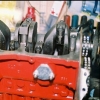
To Bleed Or Not To Bleed...
#1

Posted 02 July 2015 - 05:40 AM
#2

Posted 02 July 2015 - 06:09 AM
#3

Posted 02 July 2015 - 09:04 AM
I don't think it would drain back, as once the air has left it is under vacuum?
#4

Posted 02 July 2015 - 09:14 AM
you will not gain anything noticable. but the change in pressure will be slightly faster to change as there will be less air in the line but there will still be air in the unit.
spend time doing it or spend time driving it.
i never have bothered bleeding any pressure gauge.
#5

Posted 02 July 2015 - 10:27 AM
#6

Posted 02 July 2015 - 10:35 AM
Think of it as sucking water into a straw and putting your finger over the end- the water stays in, until you let your finger off. Vacuum is probably the wrong word, more likely something to do with surface tension.
#7

Posted 02 July 2015 - 10:46 AM
I've tried bleeding mine before but i found that it sucked air back out of the gauge into the pipe anyway so i just gave up and it works fine :)
#8

Posted 02 July 2015 - 12:04 PM
I'll leave it well alone then, thanks chaps!
#9

Posted 02 July 2015 - 04:29 PM
It can be a messy process ...
#10

Posted 03 July 2015 - 12:15 PM
Totally, 100% unnecessary. Pressure is pressure be it in air or water. The compressibility of air will make the gauge respond SLIGHTLY slower on initial engine start. After the engine is started you will be VERY hard pressed to see any difference in response time.
Do not waste your time bleeding the line to an oil pressure gauge.
#11

Posted 04 July 2015 - 11:50 PM
I only do it because when fitting a new pipe it takes no extra time, and if its a clear tube the air bubles look rubbish ![]()
#12

Posted 05 July 2015 - 03:26 PM
Be very careful with those nylon oil pressure lines. They harden and become brittle with age. They also are easy to damage when working on the engine.
1 user(s) are reading this topic
0 members, 1 guests, 0 anonymous users



















